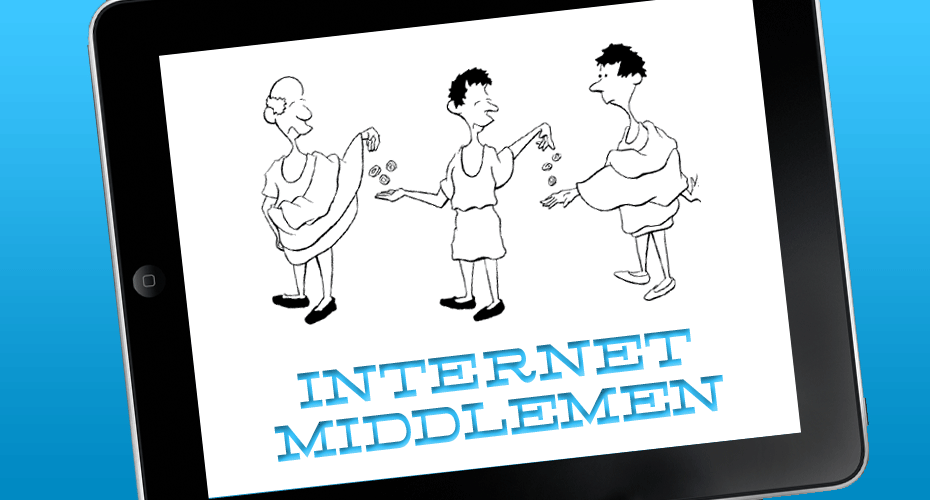Goal of the internet: destroy middlemen
Remember back when the internet was going to destroy the middleman? The New Yorker ran a famous cartoon back in 1997 with seven business people sitting around a conference table, and the caption reads, “On the one hand, eliminating the middleman would result in lower costs, increased sales, and greater consumer satisfaction; on the other hand, we’re the middleman.”
While I doubt the cartoon’s creator had real estate in mind, real estate agents and brokerages have been grappling with how to successfully merge the off-line world of real estate with the on-line world for well over a decade. However, as 2013 begins the internet hasn’t eliminated the middleman in real estate but instead created more!
Zillow and Trulia, for example, are both advertising business that run on the display of real estate information. They are the new middlemen, and they are profiting quite handsomely – primarily by selling ads to real estate agents while providing consumers with information that may or may not be accurate. In fact, one could cynically argue that they have a strong incentive to make the listing agent information difficult for a consumer to discover, because that increases the value of the ads they are running alongside a particular listing.
I’m not here to say that Zillow and Trulia are the enemy or the answer, but to instead ask why most industries have found the internet to be a phenomenal way of reducing middlemen and costs while the internet has created more middlemen in Real Estate. To answer this, I want to compare real estate to two industries – book publishing and travel.
How publishing middlemen were destroyed
Amazon.com, for example, started out to change the publishing industry by making it just as easy to buy a book at home as it was to buy in a store. As the world quickly discovered, amazon.com actually had some advantages by being online. For example, they could stock millions of books, unlike local stores that were limited by their physical space. When amazon.com started, way back in the 1990’s, the kindle had yet to be invented, so it wasn’t even a matter of re-inventing book delivery, this was just about being able to create the world’s biggest inventory of books because they could build warehouses anywhere cheap land was available near a major airport.
But when you buy a book, you always get the same thing: a bunch of words. They may be printed on a page and bound in soft cover or hard cover or they might be digitally displayed on a screen. Regardless, though, you buy a book and you get your words. And you can read those words pretty much anytime and anywhere you want, with very little possibility that things will go wrong. And if things do go wrong? It’s probably not a big deal. Regardless of how much the book cost, it isn’t a financial investment that is a part of your retirement strategy. And no matter how good the book is, you would never invite friends over to just look at your book (you might be a member of a book club, but book clubs get together to discuss the book, not to actually look at each other’s copy of a book).
How travel middlemen were destroyed
The internet has also transformed the travel industry. While we used to go to a travel agent to plan out a complex trip and book tickets, most people do those things online now. And while a plane ticket might be more expensive than a book in the above example, a seat on a plane is, well, a seat on a plane. No one ever sees a really cheap seat and wonders, “Hey, is that seat located inside the pressurized cabin or is it bolted out on the wing?” While there are a variety of seats available within a plane – coach, business or first class – they all essentially do the same thing, and once you have consumed your plane ticket, you move on with your life. Perhaps your plane trip has resulted in the memories of a lifetime, a new client, or a visit to see a long-lost friend. Unlike a home, a plane trip or a book is a consumable item.
How middlemen have thrived in real estate
Real estate is fundamentally different for a variety of reasons, but let’s look at a few. For one thing, brokerages have never possessed a physical inventory of homes for sale. No real estate agent has ever offered to take anyone back to the warehouse to see this year’s available homes, although we have put millions of people in our cars to go visit the homes available in a specific neighborhood. But there is no economy of scale to be gained with a really big warehouse of homes, because homes don’t exist in warehouses, they exist in neighborhoods. Furthermore, while two homes may be very similar, no two homes are identical. Real estate, by its very nature, cannot be commodified.
Websites now offer consumers a wealth of information (some accurate, some less-so) about homes online, yet I’m willing to venture that there is nothing – ever – that will replace physically visiting a home you are interested in purchasing. Why? Because no matter how much information you put online, sometimes the most important things about a home are the things that you can’t see in the marketing text or the pictures. For example, is the master bedroom window under a streetlight that shines excessively bright at night? Is the home at the top of a steep hill that would not be easily accessible by a disabled individual? Does the breeze from a landfill usually blow odors towards the house? Is the next door neighbor a lunatic who throws parties until 4am on a regular basis? In other words, what makes a home desirable is not just the presence of some features, but also the absence of certain other features. Making valuation even more complex, home buyers often don’t always agree about the value of particular features.
Homes differ from both other consumer goods and financial instruments because they have an innately physical and fixed presence, and they exist in a context of other homes and people. Regardless of what book you place on either side of War and Peace, the book in the middle will always be War and Peace. But a home with two great neighbors is more valuable than a home with two horrible neighbors. Homes are also not a disposable consumer good. No one ever says, I’m finished with that home lets put it on the shelf and go buy the sequel. And while people might like to brag or worry about how their investment portfolio is doing, no one ever invites you to come over and enjoy the physical presence of their stocks or bonds.
If I had to sum it all up, I’d say the most distinguishing feature of real estate is permanence. Not only are the permanently and innately tied to their environment, people purchase homes for the long-term. Real estate is neither consumable nor disposable, which may explain why rental sites like AirBnB do well – if you get a bum vacation rental, you aren’t stuck there for the next three – five years of your life.
The takeaway
Regardless of the unique traits of real estate, consumers clearly want accurate information about homes online. In 2013, I think the real estate industry owes it to our clients to find a way to deliver that information with fewer middlemen.
Matt Fuller brings decades of experience and industry leadership as co-founder of San Francisco real estate brokerage Jackson Fuller Real Estate. Matt is a Past President of the San Francisco Association of Realtors. He currently serves as a Director for the California Association of Realtors. He currently co-hosts the San Francisco real estate podcast Escrow Out Loud. A recognized SF real estate expert, Matt has made numerous media appearances and published in a variety of media outlets. He’s a father, husband, dog-lover, and crazy exercise enthusiast. When he’s not at work you’re likely to find him at the gym or with his family.










































markbrian
January 10, 2013 at 2:27 pm
Ummm…couldn’t it be argued that real estate agents are also middlemen? Not trying to start a $#!+ storm or get attacked. Just saying…
Matt Fuller
January 10, 2013 at 4:39 pm
Real estate agents make the market by bringing buyers and sellers together. Back in the 1990’s the industry was terrified that the internet would be the end of agents, but here we are in 2013 and not only are agents still in business, we’ve managed to create more middlemen. I think it’s a fascinating contrast to many other industries, I’m sorry if it came across as complaining, I find it puzzling.
Mark Brian
January 10, 2013 at 4:51 pm
Matt I didn’t really think you were complaining. I was just playing Devil’s Advocate LOL. Excellent article and I look forward to reading more from you!
Matt Fuller
January 13, 2013 at 1:22 pm
Thanks, I appreciate it! 🙂
Ron Aguilar
January 10, 2013 at 3:10 pm
I agree with your takeaway.
Matt Fuller
January 10, 2013 at 4:40 pm
Thanks!
Chad McBain
January 10, 2013 at 9:12 pm
Matt I applaud you lol. Seriously though I have made very similar statements to our team for years now however you articulate it better then I. Spencer Rascoff even stated as much @ the WTIA meeting. The video can be found on youtube and his points about the fact Realtors are not going away start around the 31-33 minute mark. A point that you make that should be heeded is making the consumer experience so much better if you wish to thrive, amen. Very well written, I look forward to more of your posts.
Matt Fuller
January 13, 2013 at 1:22 pm
Chad, do you happen to have the youtube URL handy? I’m feeling really lazy this morning!
J Philip Faranda
January 12, 2013 at 8:33 am
I am no middle man. I reject the term. I am a trusted adviser and advocate in a transaction which was, is and never will be point and click.
Matt Fuller
January 13, 2013 at 1:24 pm
J Phillip,
Middleman has always (IMHO) had a negative connotation – an extra layer that isn’t necessary. I agree with you that we don’t just stand in the middle doing nothing, I very much think we make the market happen in a lot of different ways, many of which you point out!
DavidPylyp
January 12, 2013 at 11:17 am
I love the article topic and perspective. Our industry is indeed under assault by everyone with a computer that thinks Selling a house is merely posting the advertisement online. They don’t realise that having the data has nothing to do without a way to measure the validity of the data and examining what’s a priority in someone’s life.
Being a REALTOR provides a barometer of value relative to the market and a better understanding of the market conditions that govern that price. We are truly in the people’s needs filling business.
David Pylyp
Etobicoke Real Estate Agent
Matt Fuller
January 13, 2013 at 1:25 pm
I agree with you with a qualified asterisk. I think your definition of Being a Realtor applies to great agents, but there are plenty of agents that aren’t great and think real estate is just an easy dollar to be made. But that’s a whole different can of worms!
Todd Carpenter
January 14, 2013 at 9:02 am
I work for Trulia, but this is my own opinion. The role that Trulia and Zillow play in real estate has been around long before the Internet. Real estate agents and brokers used to spend their marketing dollars on newspaper adds, real estate magazines, and direct mail. Now they spend more and more of their marketing budget on the Internet.
Amazon and Expedia are seen as the disinter-mediators of book store owners and travel agents. Often, real estate professionals look at Zillow and Trulia and worry we are trying to do the same thing. It’s just not going to happen. As Matt wrote, a house is not a seat on a plane. We’re not trying to compete with the agent. We are trying to compete with all those other companies that provide marketing services to agents and brokers.
JoeLoomer
January 14, 2013 at 12:36 pm
I completely object to this post – my parties are usually over WELL before 4 a.m.!!
Navy Chief, Navy Pride
James
January 15, 2013 at 11:03 am
How viable is it for a consumer to write down 10 listings they like, then schedule appointments to see the houses without involving a buyers agent?
Andrew Mooers
January 23, 2013 at 6:47 pm
Videos of the area first for outside new buyers, then one after another full motion, with natural sound deliver the information so well. At one stop individual sites, blogs, video platforms linked to social media. There is not reason to have to keep the herd habit, knee jerk along with forking over beaucoup dollars for better “seating” for eyeballs. On sites populated by your own covered dish, invited to the real estate buffet tid bits for the dog and pony.
Pingback: Artificial Intelligence (AI) in real estate: Negating or monetizing an agent's experience? - The Real Daily
Pingback: New real estate search engine reveals "the truth" about properties